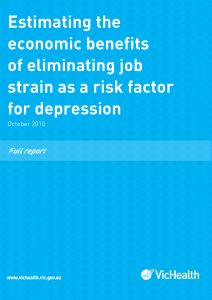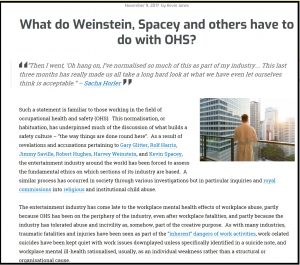 At the recent Scientific Meeting of the Australia and New Zealand Society of Occupational Medicine (ANZSOM), Allison Milner stepped in for an ill Tony La Montagne and added value to his intended presentation on workplace mental health. This meeting is different from other conferences in one particular way, in relies on evidence and not marketing for its presentations. This difference made Milner’s presentation very powerful.
At the recent Scientific Meeting of the Australia and New Zealand Society of Occupational Medicine (ANZSOM), Allison Milner stepped in for an ill Tony La Montagne and added value to his intended presentation on workplace mental health. This meeting is different from other conferences in one particular way, in relies on evidence and not marketing for its presentations. This difference made Milner’s presentation very powerful.
Milner set the scene with a broad picture of mental health:
“1 in 5 Australians have a mental illness, which equivalates to about 1.5 million. And over 3000 people lose their life to suicide every year, and the vast majority of these people being men. But suicide affects far more people than those people who attempt or sadly lose their life. It affects their work colleagues, it affects people in our community and it affects our family.”
Continue reading “The importance of evidence in addressing workplace mental health issues”

 Some organisations struggle to understand the prevention of harm. In September 2018 the Chartered Institute of Personnel and Development (CIPD) released its “
Some organisations struggle to understand the prevention of harm. In September 2018 the Chartered Institute of Personnel and Development (CIPD) released its “


